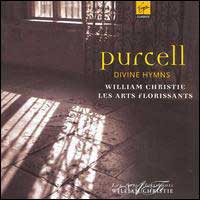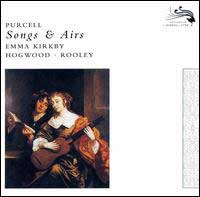Close Enough to Saint Cecilia?
- CDs: Emma Kirkby with Christopher Hogwood and others: Purcell: Songs & Airs
- William Christie/Les Arts Florissants: Purcell: Harmonia Sacra (Divine Hymns)
It's late November, when my thoughts turn not so lightly to English composers. And I've been a bad blogger. The 22nd of November was both Benjamin Britten's birthday and the feast of Saint Cecilia, patroness of music, and I did nothing to mark either occasion (well, nothing aside from eating too much). Worse still, I can't rectify the situation by showcasing a hot new recording of Britten music this week.
I can almost make up for it by giving a shout-out for two newly available albums of works by another English composer, Henry Purcell, forever linked to Britten in one sense and another. Among their connections: both men composed music in honor of Saint Cecilia.
 The first album, by Les Arts Florissants, is a reflective but not at all dour performance of hymns from Purcell and his contemporaries John Blow, William Croft, and Pelham Humfrey.
The first album, by Les Arts Florissants, is a reflective but not at all dour performance of hymns from Purcell and his contemporaries John Blow, William Croft, and Pelham Humfrey.For those of you who think "hymn" is the musical equivalent of "grim," think again. Of course I'm prejudiced, as I listen to the shape-note hymns of William Billings for fun. But if you are any sort of classical music listener, you'll have a hard time keeping spiritually oriented compositions off your play list.
And Harmonia Sacra possesses an intimacy and a tenderness that may surprise those who expect their baroque music to be brisk and/or booming. These are cries and whispers straight from the human soul. Listen to the soprano soloist in Purcell's "Tell me, some pitying angel" -- what delicate, lovely performance.
The instrumental accompaniment -- harpischord, organ, viola da gamba, theorbo -- is equally restrained, setting off the vocals but not overwhelming them. That's conductor William Christie playing the organ and harpischord.
 The second Purcell selection, Songs & Airs, is in a distinctly different mood. This is secular music, often tinged with melancholy, though some of it is quite earthy, in the conceit-laden manner of the poets. "When first Amintas sued for a kiss" even recalls that perennial line "Your lips say no, no, no, but your eyes say yes, yes, yes." There really is no new thing under the sun.
The second Purcell selection, Songs & Airs, is in a distinctly different mood. This is secular music, often tinged with melancholy, though some of it is quite earthy, in the conceit-laden manner of the poets. "When first Amintas sued for a kiss" even recalls that perennial line "Your lips say no, no, no, but your eyes say yes, yes, yes." There really is no new thing under the sun.And that radiant voice of early music, Emma Kirkby -- ahem, Dame Emma, as of this year -- is on hand to interpret the texts in Purcell 's settings. You likely know Kirkby from an extensive catalog of recordings and a career in which she has covered material from the medieval era to the 20th century. In fact, I would note that her output is bookended by female composers on either end: the German abbess Hildegard von Bingen and the American Amy Beach.
Kirkby's voice is unmistakable to lovers of early music: that chaste, vibrato-free soprano. One reviewer called it "boyish," but I find that wide of the mark. Kirkby's voice captures both youthfulness and femininity, and it's definitely for grown-ups.
This Purcell album of hers, Songs & Airs, is actually a L'Oiseau Lyre reissue, just out this month, of a recording Kirkby made in 1982. Distinguished early music colleagues are on hand to provide accompaniment: Christopher Hogwood on organ and spinet, Anthony Rooley playing the lute, Catherine Mackintosh on violin, and Richard Campbell on viola da gamba.
As with the Christie recording above, this is baroque on a smaller, intimate scale, stripped down to a pure voice and a well-chosen ensemble of accompanists. It is as lovely as anything you'll hear in this wistful season, and you'll be just as ready to listen again when spring returns to the Earth.




0 Comments:
Links to this post:
Create a Link
<< Home